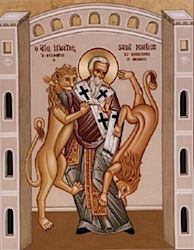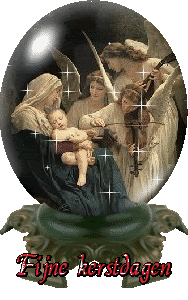 One of the real joys of spending time reading and studying the writings of the earliest Christians (aka the Early Church Fathers) is gaining a bit of insight into what life was like those who professed to be Christian.
One of the real joys of spending time reading and studying the writings of the earliest Christians (aka the Early Church Fathers) is gaining a bit of insight into what life was like those who professed to be Christian.Posted on 01/15/2012 2:36:04 PM PST by narses
 One of the real joys of spending time reading and studying the writings of the earliest Christians (aka the Early Church Fathers) is gaining a bit of insight into what life was like those who professed to be Christian.
One of the real joys of spending time reading and studying the writings of the earliest Christians (aka the Early Church Fathers) is gaining a bit of insight into what life was like those who professed to be Christian.
One of the real surprises (at least to me) was how early the term “Catholic” came to be used to refer to all Christians.
How early? How about the year 107 … maybe even earlier!
From the Letter to the Smyrnaeans by St. Ignatius of Antioch:
Wherever the bishop appears, there let the people be; as wherever Jesus Christ is, there is the Catholic Church. It is not lawful to baptize or give communion without the consent of the bishop. On the other hand, whatever has his approval is pleasing to God. Thus, whatever is done will be safe and valid.
Note that St. Ignatius is a real hero of the early Church – both a bishop and a martyr at the hands of the Romans, he left an awesome written legacy of letters to local churches … primarily encouragement as he marched to his martyrdom.
The current wiki article presents a good overview of the life of St. Ignatius of Antioch. From that article comes this paragraph:
It is from the word katholikos that the word “catholic” comes. When Ignatius wrote the Letter to the Smyrnaeans in about the year 107 and used the word “catholic”, he used it as if it were a word already in use to describe the Church. This has led many scholars to conclude that the appellation “Catholic Church” with its ecclesial connotation may have been in use as early as the last quarter of the first century.
While this may seem like a small point, I think it’s rather significant – the sense of universality, of all Christians belonging to the church that they themselves called katholikos … this gives us some real insight into what Christians thought important.
An Opposing View
Notice it is in direct contrast to the probably well-intentioned, but definitely historically inaccurate perspective of those who oppose the reality of the one Church founded by Jesus Christ. Typical of this perspective is a recent post by Thomas H., who writes from a Baptist perspective:
The application of the word “catholic” was not used in reference to all supposed Christians until the Council of Trent. This word was used by catholics to beat over the heads of non catholics in the sence of saying you do not belong to the true church. This resulted in the murder of hundreds of thousands of Christians who were not Roman Catholics by the emissaries of Rome.
I think you get the idea … the only real problem with all that is it doesn’t square with the historical record on any level, starting with the word catholic.
The Historical Reality
I can empathize with folks like Thomas – when you have spent your whole life being told bits and pieces of what happened, along with stuff that’s simply not true by folks who spent their lives in the same circumstances, it must be hard to be open to the reality that contradicts what you believe.
Yet, the historical record is clear, and provides an eloquent testimony to the truth … from its earliest days the Church understood that unity and universality were basic marks of the Church founded by Jesus Christ.
It began calling itself katholikos around the end of the first century, at most a few years after the death of the last apostle (John). It did not begin with the Council of Trent (late 16th century – nearly 1500 years later) or any other time. In fact, by the time the canon of Scripture – what we call the Bible – was settled Christians had been calling themselves Catholics for almost 300 years … longer than the United States has even been a country!
That Church remains Catholic to this day, and will remain so until the end of time (Matthew 16:18+).
An Invitation
If this does not seem right to you, please investigate on your own. Look into the historical record – pagan, Jewish, or Christian – and see what evidence supports each side. What you’ll find is exactly what the Church has always understood … it is katholikos, and has been so from the beginning.
The writings of the Early Church Fathers are widely available, with treatments ranging from the easily-accessible to the more in-depth, scholarly works. A good place to start for most folks is Four Witnesses by Rod Bennett – a very readable account, well-grounded in current scholarship,
Freep-mail me to get on or off my pro-life and Catholic List:
Please ping me to note-worthy Pro-Life or Catholic threads, or other threads of general interest.

People need to quit confusing “Catholic”, which means universal, with “Roman Catholic”. In the early Christian Church, everybody was considered “Catholic”. Some useful sources include www.goarch.org, www.oca.org and www.antiochian.org.
My Bible doesn't have that word Catholic in it anywhere. Are you sure you're not playing loosy goosy with a private interpretation?
very well said. After nearly 50 years on my journey - I have found that what Jesus founded was one universal cathoic church - The Catholic Church. Everything else Christian is the broken church of believers - it is broken because of the sin of man from both within and outside the one Church Jesus Christ founded.
Even in the early days, as we find in the Book of Acts, there were splinter churches and dissenters. One of the marks of the true Church was that it was universal, not a dissident local church.
So when it came to defining the Church at the Council of Nicea, it was said to be One, Holy, Catholic, and Apostolic.
There is only one true Church. So it says in the Bible. That one true Church is also seen to be Apostolic, headed by the bishops who descend from the original Apostles in unbroken succession. Catholic Church simply means Universal Church.
That was one reason why I left the Anglican Church, because like Newman I concluded that there was no way that it could be the universal Church, throughout the world and through all time since its founding by Christ. I received great good from growing up in the Anglican Church. I have read and considered its own claims to be universal and apostolic, and I found that I simply could not justify those claims.
The Council of Nicea put the word Catholic into the creed, but of course, as this article suggests, the word can be found much earlier, as a response to splinter groups that go back to the earliest days when the original apostles were still active.
My Bible doesn’t have the word[s] “Bible in it either”, Nor Holy Trinity, Incarnation, Original Sin, Two Natures of Christ yet One Divine Person. I also don’t find the word “abortion in it either” for example.
I could go on an on. Mt 16: 18 is more about Petrine Ministry. Mt 28 and the great Commission point to the Catholicity of the Church. Together, Catholicity and Unity, both Mark of the Church expressed in the Nicene-Constantinopilian Creed are strengthed by the Petrine Ministry which thru which Full Catholicity is maintained.

Jesus never Declared he had a Mother either! but He was a Baby.
Also they did not go to the bathroom either because it is not in the New Testament Bible.

Jesus never Declared he had a Mother either! but He was a Baby.
Also they did not go to the bathroom either because it is not in the New Testament Bible.
Good Grief! Double again!
What word does your bible have?
Ephesians 4
Make every effort to keep the unity of the Spirit through the bond of peace. There is one body and one Spirit, just as you were called to one hope when you were called; one Lord, one faith, one baptism; one God and Father of all, who is over all and through all and in all.
Indeed. One Lord, One Church, One Truth.
“In the early Christian Church, everybody was considered “Catholic”
Yes, and the “Catholics” of the early Christian Church believed in the true prescence of Christ in the Eucharist just as the Catholic Church of today continues with this timeless teaching of Jesus:
St. Paul himself could not have been more clear: 1Cor 10:16, “The cup of the blessing that we bless, IS IT NOT THE SHARING OF THE BLOOD OF CHRIST? And the bread that we break, IS IT NOT THE PARTAKING OF THE BODY OF THE LORD?”
I agree, the non-Catholic Christian Churches of today hold little in common with the original “Catholic” church of the apostles.
Extremism in the posting of Truth is a Virtue, if I may misquote Barry.
We Anglicans still call ourselves “catholic”.
Are you sure you're not playing loosy goosy with a private interpretation?Oh yeah, I am sure.
Unlike the weirded out backwoods preacher types, actually going to source documents and accepting the truth helps. Or you can perform a do-it-yourself orchidecthomy like the cult leader of the Hale comet crowd did, or kidnap yourself like "Sister" Aimee.


I know, and many of you are returning Home to Rome as the Arch-Druid and his weirdness become more than they can bear.
Not everyone was catholic. There were catholics and heretics. And there were plenty of heretics, as well as cults posing as Christian, as there are today.
Disclaimer: Opinions posted on Free Republic are those of the individual posters and do not necessarily represent the opinion of Free Republic or its management. All materials posted herein are protected by copyright law and the exemption for fair use of copyrighted works.